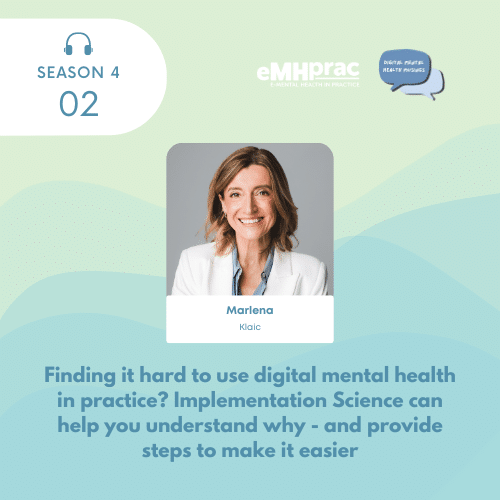At eMHPrac we aim to not only share knowledge about digital mental health services but support the health workforce to effectively and consistently utilise them in practice. In this pursuit we seek to address many questions such as; ‘why should health professionals look to digital mental health?’, ‘what problems can digital mental health help health workers overcome?’, and ‘what challenges can the use of digital mental health present for health professionals?’ These are the same questions the implementation science seeks to address.
What is Implementation Science?
Implementation science is a relatively new field of research, seeking to bridge the gap between research and practice by understanding what makes it difficult to get research into practice and developing strategies and systems to overcome those barriers. It seeks to develop methods to promote uptake of evidence-based practice and resources into routine care to improve the quality and effectiveness of health services.
Implementation science looks beyond the effectiveness of a clinical innovation to identify and understand the barriers and motivators that influence acceptance and implementation of research innovations. It explores not only if an intervention is technically effective, but what factors influence its perceived effectiveness and suitability for use.
Importantly, implementation science understands that the factors that promote or hinder practice change are influenced by more than the individual health professional. The capacity for meaningful and genuine practice change is also deeply connected to complex organisational structures, process and systems, and the political and economic environments health professionals work within – all of which can be very different to those in trial settings.
To help researchers and health professionals create system change and integrate best practice into care, implementation science has developed frameworks, models and strategies that have been shown to improve the uptake of evidence-based innovation in practice.
Here in Australia, implementation science practitioners are making important advances to the field. Researchers from the University of Melbourne have developed an implementation framework that could help us better understand what makes new, evidence-based interventions ‘stick’ and embed into routine care.
The research, led by senior research fellow Dr Marlena Klaic, suggests that there are three characteristics that influence the sustainability and scalability of a healthcare intervention – and, ultimately, how likely it is to be adopted into everyday clinical care. Those three factors are acceptability – the degree to which health professionals and clients agree with the intervention; fidelity – the degree to which an intervention is delivered as intended based on the education and training initiatives required to support its delivery; and feasibility – the resources and costs associated with the intervention roll out.
Speaking on eMHPrac’s podcast, Digital Mental Health Musings, Dr Klaic explains that while each characteristic was shown in a comprehensive literature review to be important indicators of intervention uptake, none were sufficient on their own to predict the likely adoption – or implementability – of an intervention into routine clinical care.
Understanding the attitudes and behaviours that optimise these three characteristics could help researchers, health professionals and policy makers do more of what is known to be effective.
What does this mean for digital mental health?
Current research suggests that it takes approximately 17 years for evidence-based practices to be implemented into routine care2. This is particularly problematic for digital mental health services, as technology continues to develop at a rapid pace, making it difficult for real world practice to keep up. With the help of implementation science, we can understand what the barriers to its uptake are and develop strategies to overcome them.
The study of implementation science can inform not only the development of new digital innovation to ensure they are suitable for clinical practice, but aid individual health workers, organisations or support bodies like us to ease the transition of digital mental health services from research concept to routine care. It can help us find answers to our common questions and find practical ways to overcome them.
Learn more

Want to learn more about how implementation science can help you? Hear Dr Marlena Klaic, decode some of the common attitudes and behaviours health professionals express about digital mental health, from an implementation science lens. We discuss some of the barriers you might experience yourself when it comes to using digital mental health – and the steps to overcome them.





